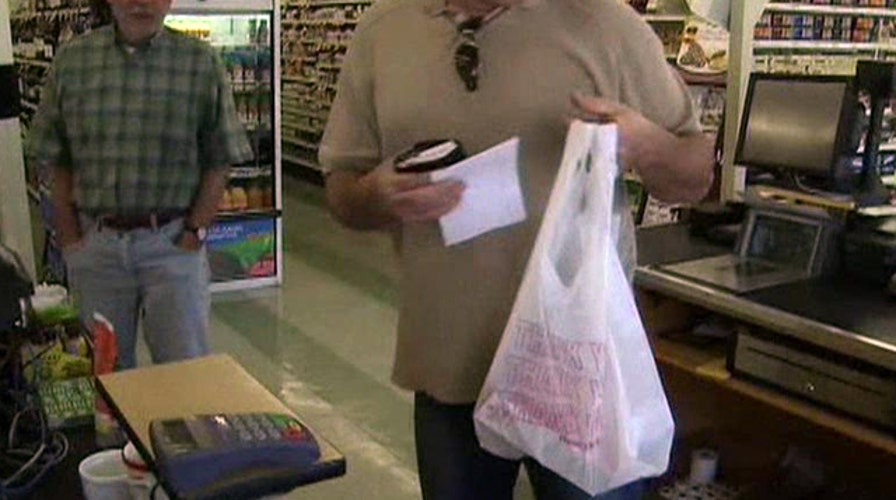This is a rush transcript from "The Five," February 6, 2013. This copy may not be in its final form and may be updated.
GREG GUTFELD, CO-HOST: Last year, San Francisco banned plastic shopping bags for the reusable cloth kind to help save the birds. But what's good for sea gulls is bad for non-sea gulls, I refer to people. Those creatures who have opposable thumbs and don't poop on your head.
Researchers at UPenn Law say the eco-friendly cloth sacks actually contain harmful bacteria which have already killed humans. It's associated with 46 percent increase in deaths from foodborne illnesses. That's boost in death in that county of five and a half people or 12 Dana Perinos. They also note that the health cost and linked with this bag, the plastic bag ban, dwarfs the savings from reduced litter.
But do facts of fatalities matter when you're green? No green is cool and cool beats truth and human suffering hands down. So, to bow before the altar of environmentalism, you must accept that a seagull is no less important than your sister. What's a few deaths if it makes one pointless bird safer? I speak of Barbara Boxer.
But this is nothing new. The greenies pushed to ban DDT, killed millions of people worldwide, thanks for the spread of malaria, and their love of birds apparently stopped at those ugly wind mills which killed more of our feathered friends than KFC, Popeyes and Chick-fil-A combined.
Forget the inhumanity of unmanned planes. The deadliest drone of all is Al Gore.
See what I did there?
DANA PERINO, CO-HOST: Yes, the theme.
(CROSSTALK)
GUTFELD: But, Dana, in the break, you were saying a seagull's life is more valuable than a human life? Explain.
PERINO: One hundred percent. Have you seen them flying around so beautiful?
ERIC BOLLING, CO-HOST: I am extremely concerned about this. Dr. Siegel and his family are more important than us?
(CROSSTALK)
BOB BECKEL, CO-HOST: First of all, it's Siegel not seagull.
ANDREA TANTAROS, CO-HOST: They're flying rats.
GUTFELD: Flying rats.
TANTAROS: Flying rats.
BECKEL: Can I just make a point in defense of this? And first of all, you need petroleum to make these things, these plastic bags. We are always arguing because we don't have enough petroleum, the prices are way up. I think it makes a lot of sense to do away with plastic bags.
And poor people, frankly, you know, poor people could die by falling in a toilet.
GUTFELD: That is such a liberal perspective. It's bad use of petroleum. But it's -- people dying, that's OK.
By the way, you use a lot of petroleum products Bob.
BECKEL: I do.
GUTFELD: Yes, you do.
BECKEL: I see what you're getting at there. You're right.
GUTFELD: Eric, where do you stand on this?
(LAUGHTER)
BOLLING: I'm not standing, I'm sitting. I don't know --
PERINO: Do you carry around one of those bags?
(CROSSTALK)
GUTFELD: If you use cloth bags, you will die.
BOLLING: Because you don't wash the cloth bags and they retain all the bacteria and bad things that happen when food leaks in the bags. So, people are being contaminating themselves with what the cloth bags.
GUTFELD: It's like using a diaper.
TANTAROS: What?
GUTFELD: Yes.
(LAUGHTER)
BOLLING: I'm for businesses providing whatever they want, not having the government tell them that they can or cannot paper or plastic. They want to provide paper or plastic, let them do it.
PERINO: I don't like the shaming that comes along with not carrying your own bag, like you forget to bring your little fancy bag with a logo on it. And then you go to the grocery store, and they say, did you bring your bag? And you say, no, they charge you more and they announce it over the loud speaker, basically, I just order in.
BECKEL: What about personal responsibility? People are supposed to clean the bags and few of them die.
TANTAROS: Wait. Am I missing something here? How often does food leaks over these bags? I mean, if it leaks, throw the bag out. Get another bag. It sounds like rat-infested, worm, like --
(CROSSTALK)
GUTFELD: I don't want to know.
PERINO: I think it's crazy.
BOLLING: How much T-bones leak.
GUTFELD: I don't know.
No, I was talking about the idea that people felt that disposable diapers were evil until you realized how much detergent you had to use to cloth diaper hurts the environment.
BECKEL: And have you ever noticed when we walk in the house, I don't care how much they try to cover that smell, if you into a house when there's babies, it's just boom!
TANTAROS: What about those little carts that you see people pulling in New York City?
GUTFELD: How does one know that they need the cart before they go to a grocery store? I always go to the grocery store. I don't have my little sack and I don't have my little cart.
PERINO: This is something the chiropractors of America have started. They have a whole -- there is whole conspiracy, so the chiropractor mafia?
GUTFELD: Yes.
PERINO: So that you get to carry around those little carts and look like a tool.
BECKEL: You are targeting the homeless. They're the ones who are mostly --
TANTAROS: No, I'm targeting the liberals that yank their carts around.
BECKEL: You are always targeting the liberals.
TANTAROS: No, not always.
Content and Programming Copyright 2013 Fox News Network, LLC. ALL RIGHTS RESERVED. Copyright 2013 CQ-Roll Call, Inc. All materials herein are protected by United States copyright law and may not be reproduced, distributed, transmitted, displayed, published or broadcast without the prior written permission of CQ-Roll Call. You may not alter or remove any trademark, copyright or other notice from copies of the content.

